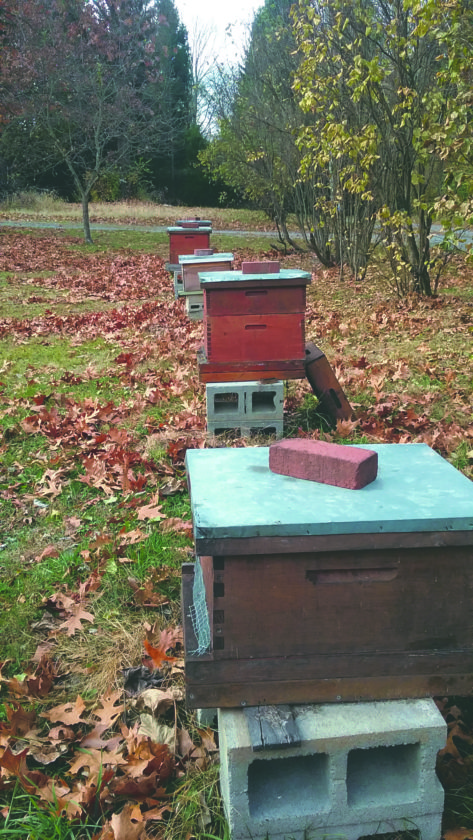By DANYEL VANREENEN
The Journal
KEARNEYSVILLE, W.Va. — In October, seven types of bees were added to the endangered species list for the first time in history. All seven species originate from the Hawaiian islands, however, bee populations across the world are declining.
West Virginia has also experienced declining bee populations in the last decade. The West Virginia Beekeepers Association (WVBA) is doing what it can to prevent the bee populations from further declining.
Paul Cappas, president of the WVBA, said West Virginia has definitely been affected by

(Journal photo by Danyel VanReenen)
the declining population of bees. Cappas reported wild bees in the state are nearly non-existant.
“The commercial and hobby beekeepers are what’s really keeping the bees going right now,” Cappas said.
Cappas said there are a few reasons the bee population is declining. Part of the problem stems from the Varroa mites.
According to Cappas, Varroa mites first became a problem 25 to 30 years ago. Mites began infecting bees with viruses, causing them to die off. The mite spread through international trade and commerce, but now the mite is affecting bee populations on every continent.
“Another issue affecting bees is the use of pesticides and herbacides,” Cappas said. “We’re a spray happy society, and it’s become a problem. People think it doesn’t harm anything, but it does.”
Jennifer King, owner of Eversweet Apiaries and president of the Mountain State Beekeepers Association, maintains about 30 hives.
“Every year is a challenge,” King said. “Bees face the perfect storm. The mites weaken their immune system, then they can’t handle the pesticides or the cold weather.”
Despite the population crisis, Cappas believes West Virginia is a lucky state because we have unique ecosystems and resources bees can still rely on to survive on their own in the wild.
“We have a lot of variety for the bees,” Cappas said. “We have wild flowers, trees and maple supply which bees rely on quite a bit. By cultivating the supply of maple, we help keep the bees going. The bees subsequently pollinate trees to make more maple. It’s an interconnected cycle.”
The number of beekeepers with domesticated hives is on the rise in West Virginia as well, Cappas reported.
“In 2015 there were 1,033 beekeepers in the state with 12,655 hives. In 2016 those numbers increased. There were 1,282 beekeepers with a total of 13,492 hives,”Cappas said.
Despite the positive numbers, Cappas re-asserted the gravity of the bee crisis for everyone, including West Virginians.
“So much of what West Virginia produces relies on bees,” Cappas said. “Our unique environment and ecosystem also relies on bees and pollinators.”
Ed Forney of Geezer Ridge Farm, a beekeeping facility in Hedgesville, said last year was one of the worst years for some beekeepers. Some beekeepers, he said, reported up to four percent hive losses.
Cappas also mentioned the commerce bees generate throughout the state, as well as our dependence on bees to pollinate our food and byproducts.
“Everything we eat is affected by bees and other pollinators. We’re very dependent on what they do, and we’re almost at a tipping point for the bee population,”Cappas said. “If we don’t have bees, it will be hard, or potentially impossible, to replace them.”
Cappas said becoming aware of how we use pestcides and herbacides and planting pollinator friendly plants are good ways for individuals to help the bees. King also suggested planting bee friendly plants that bloom later in the season, such as Zinnias.
King believes educating future beekeepers is another important aspect of preserving bees.
“We need the right education for our community and our beekeepers, or we’re just setting them and their hives up for failure,” King said.
Cappas agrees that education is vital to the future bee populations, but protecting the species is up to individuals.
“The future of the bee population is really in the hands of individuals,” Cappas said. “The most important thing people can do is look at the environment, culture and ecosystems around them and become cognizant of the problems we could face if we don’t become aware of how what we do affects our environment.”
For more information on bees in West Virginia, visit wvbeekeepers.org.
See more from The Journal





